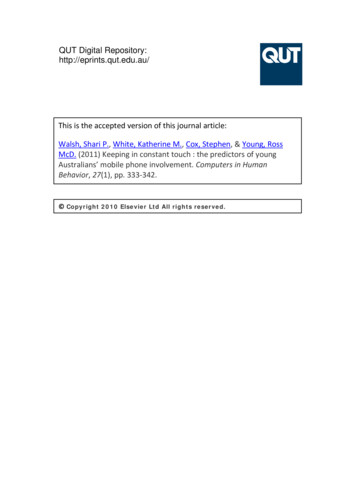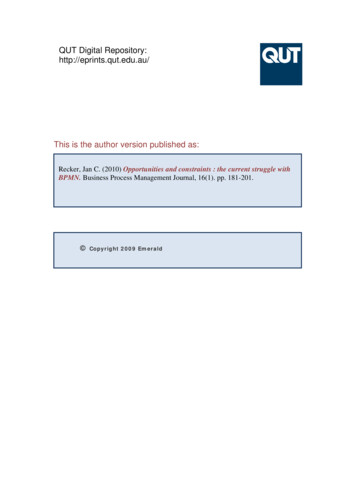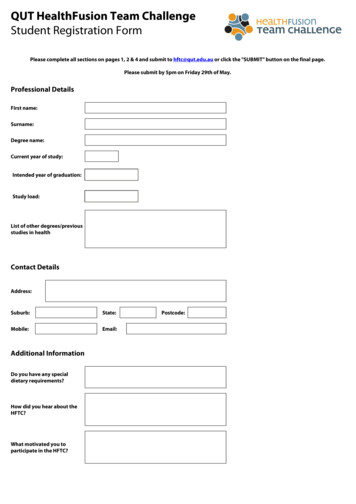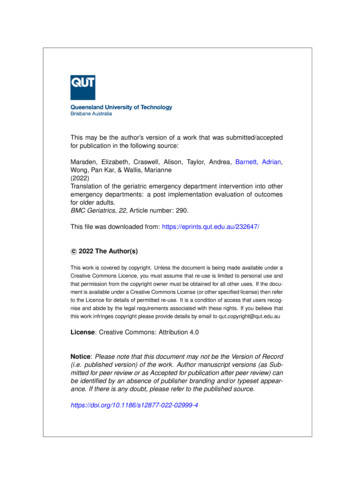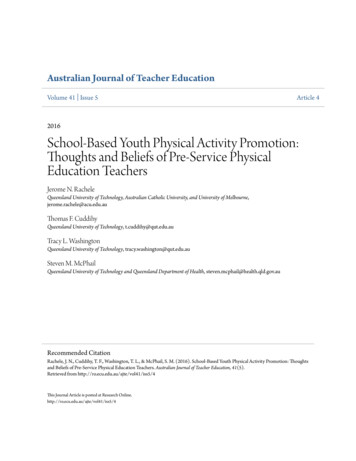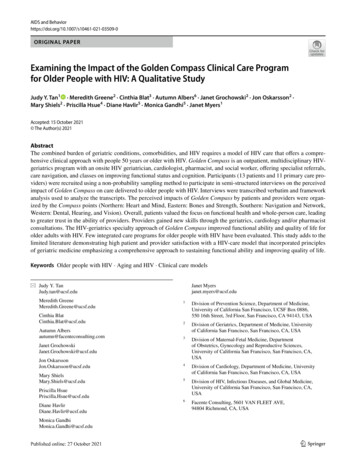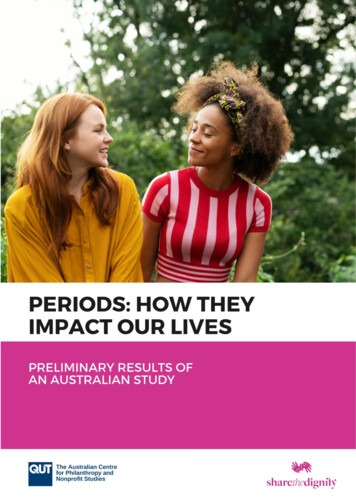
Transcription
INTRODUCTION0
August 2022 Australian Centre for Philanthropy and Nonprofit Studiesqut.edu.au/business/acpnsCRICOS code: 00213JQueensland University of Technology’s Australian Centre for Philanthropy andNonprofit Studies was commissioned by Share the Dignity to conduct this study.The report has been written by Dr Ruth Knight. We thank all the respondents whocompleted the survey and have helped us learn more about the impact of periodsand the Dignity Vending Machine on their lives. For further updates about thisstudy and ongoing research, please subscribe to qut.edu.au/business/acpns.Suggested citation:Knight, R. (2022) Periods: How they impact our lives. Preliminary results of anAustralian study. Australian Centre for Philanthropy and Nonprofit Studies,Queensland University of Technology, Brisbane, Australia.QUT acknowledges the Turrbal and Yugara, as the First Nations owners of the landswhere QUT now stands. We pay respects to their elders, lores, customs and creationspirits. We recognise that these lands have always been places of teaching,research and learning. QUT acknowledges the important role Aboriginal and TorresStrait Islander people play within the QUT community.1
ContentsExecutive Summary . 3Introduction. 5Providing free period products . 6The Study . 9Method . 9High school students . 10Respondents . 10The impact of periods . 11Managing periods . 14Using public toilets . 15Cost of buying period products . 15Tertiary students and employees . 18Respondents . 18The impact of periods . 20Managing periods . 23Using public toilets . 23The impact of periods . 24Cost of buying period products . 25The impact of free period products . 27Discussion . 31References . 332
Executive SummaryThis report details the results of a preliminary study into the impact that periodshave on women’s lives when learning, training or in employment. It providescontemporary evidence that periods often have a regular and sometimessignificant impact on productivity, mental and emotional health, relationships,attendance at work and performance.An online survey was promoted during 2021-2022 and those students andemployees that have periods were invited to respond to the survey. Therespondents were high school students (144 respondents), tertiary educationstudents and employees (237 respondents). Most identified as female, so the termwoman is used throughout this report, although we know that people with othergender identities may menstruate.Some of the key findings include: Periods can create a lot of mixed feelings and impact women in manydifferent ways due to pain and discomfort, being unable to perform normaldaily tasks, mood swings, anxiety and depression.Disposable pads and tampons are the common products of choice for allwomen when managing a period.A large percentage of high school students (70%) say if they stay at homebecause of their period, they inform their school they are unwell. Only 16%tell them it is period related.High school students have the most difficulty buying period products everymonth (12.6%) while one in ten tertiary students and employees alsoexperience difficulty buying period products every month (10.8%).Due to the cost of tampons and pads, 30% of high school students often asksomeone to purchase products for them, while 21% often wear a tampon orpad for more than the recommended four hours.There are many high school students (37%) who stated that they often orsometimes ‘make do’ (with tissue, cloth or paper for example) instead ofpads or tampons due to the cost of pads and tampons.19% of high school students and 14.7% of tertiary students and employeesoften or sometimes stay at home due to their inability to afford pads ortampons.More than half (58.6%) of tertiary students and employees report missinghalf or an entire day of work or study due to having their period.98% of high school students believe that having free pads and tamponsavailable at their school is important.3
High school students stated that the impact of having free period productsavailable at school means that they change their pad more regularly (91%),stay at school (82%) and feel less embarrassed (85%) and anxious (76%),and more confident (74%).Having free period products at school means that 61% of high schoolstudents feel their school cares about them.These are results of a small preliminary study but provide early indications that toreduce period stigma, period poverty and poor menstrual health there needs to bepolicies and practices concerning menstrual equity and dignity including: Education for students and women about how to manage their periodconfidently;Clean and appropriate toilet facilities;Free and accessible period products; andSupportive school and workplace policies that encourage good menstrualhealth and period care.4
IntroductionAround the time of 12 years old, most young women begin their monthly menstrualbleed, known as a period. For the first few years after a girl starts her period it maynot come regularly at the same time each month, which means girls can be caughtout unexpectedly and bleed without having period products with them. Pads andtampons are the most common products that women use to help manage theirperiod. Some girls and women never have regular periods and so are always atrisk of finding themselves starting their period without having access to a pad ortampon. Due to the long history of societal stigma about periods, many girls andwomen feel embarrassed if they ‘have an accident’ or experience other symptomsassociated with menstruation such as a negative mood, pain and headaches.Researcher Nina Landsbury (2021) states:Menstruation is a natural experience for most girls and women, yet it isoften associated with socially imposed taboos and shame. It can includetotal concealment of a woman’s menstrual status where shame andembarrassment are associated with others seeing leakage or soiledproducts or smelling odor.1A pervasive negative stigma around menstruation, and inability to easily accessperiod products that can help girls and women manage their periods often lead toother negative consequences. These can include feeling dirty and unclean,avoiding school, work, or other social situations, avoiding sport, or presenteeism(low productivity).2,3,4,5 One 2017 study that surveyed 32,748 women aged 15–45years in the Netherlands found that these physical and psychosocial challengescan result in an average of 1.3 days per year being lost due to absenteeism. Thewomen also reported less productivity due to their periods, so the researcherscalculated that periods and menstruation-related symptoms cause lowerproductivity approximately nine days every year.6When a person menstruating is under financial stress and cannot afford topurchase period products, this is known as period poverty. Period poverty canplace women at risk of developing reproductive and gynaecological health issuesand it adds further emotional stress to women trying to manage their period. Periodpoverty is a complex issue and limited research exists about its incidence or impactin Australia, however it may be one reason why girls and women chose to stay athome during their period rather than attend education, training or work.5
Providing free period productsIn order to stop the taboo concerning periods, reduce period poverty and providewomen with support to manage their periods with dignity and confidence, schools,higher education (e.g. TAFE and Universities), and workplaces in Australia andaround the world are adopting new policies, which include providing access to freeperiod products such as pads and tampons. Countries such as Scotland, New Zealand, France, Kenya, Uganda, SouthAfrica, and some Canadian states have implemented policies that includeproviding free period products in schools.7Some Australian workplaces such as Share the Dignity 8 and Future Super 9have introduced a paid menstrual leave policy. Share The Dignity alsoprovides an additional Personal Leave for employees who may beexperiencing severe symptoms related to their period or menopause. TheVictorian Women's Trust have also introduced a policy and provide a"menstrual policy template" for employers so they can create a policy fortheir own organisation.10Melbourne City Council agreed to a trial in 2021 that provides pads andtampons in at least six community spaces, including community centres,pools and libraries. The Council will evaluate the pilot to determine potentialexpansion of the service to other council facilities.11Universities such as the University of Iowa in the United States and MonashUniversity in Australia have started offering free products. Monash Universityhas installed dispensers, providing free pads and tampons in 30 bathroomsacross their Melbourne campuses in 2021. 12,13In 2019, The Victorian Government announced they would be installingdispensing machines in every school by the end of Term 2, 2020. 14In 2021, Tasmania announced they would make period products freelyavailable in all government schools from Term 3.15The Tasmanian Government also announced free period products would bemade available in hospitals from 1 July 2022.16In 2021, the Northern Territory Government announced they would beproviding free period products in all primary, middle and senior governmentschools.17In 2022, the New South Wales government announced a program to placefree pads and tampons in all the state’s public schools, with the aim ofensuring young women’s education is not impacted by their period.18In 2022, New South Wales became the first state in Australia to offer freeperiod products for those who are unable to supply their own while inhealthcare facilities.19Commencing during Semester 2, 2022, all Queensland state schools,outdoor and environmental education centres, and student residential6
facilities will have the opportunity to register to have a Dignity VendingMachine installed to provide students with free period products.20In 2022, students at three Gold Coast campuses became the first TAFEQueensland students to be able to obtain free period products. 21These organisations have determined that providing free period products to girlsand women that need them outweighs the costs associated with poor menstrualhealth, low productivity and absenteeism. Some companies are offering free periodproducts to demonstrate a tangible commitment to employees and improvemenstrual equity, which aims to ensure that menstruation never poses a barrier tohuman dignity, employee engagement and social participation.Our research found that having products available for girls and women totake in toilets can reduce stigma and feelings of embarrassment. Productswould also be available at the time and place they were most needed.Department of Education, UK.22Providing free pads and tampons to every Australian public high andprimary school is an easy and effective way to reduce period stigma,improve students’ health and wellbeing, and minimise school absences.Greens Senator Larissa Waters.23The Territory Government acknowledges gender equality as fundamentalto improving the lives of all Territorians. Our schools play an important rolein promoting a positive culture of equality and body positivity within theirschool communities, and this program is about making our schools moreinclusive and supportive for all. Office of the Chief Minister, NorthernTerritory Government.24Let’s face it, if blokes had periods, we would have done this decades ago.Deputy Lord Mayor Nicholas Reece, Melbourne City Council. 25One less barrier to their education means that our female studentpopulation (nearly 50 per cent) will not have to decide whether they cometo TAFE because they cannot afford period products that month. It meansthat they can engage with their learning fully. For staff, we are helping toenhance their engagement and productivity which in turn means betterquality of education and service. Karen Dickinson, TAFE Queensland GoldCoast General Manager.26Despite these responses and new policies, the research about the impact ofperiods on women who are studying or working remains sparse. There is very7
limited research about the impact of providing free period products in public toilets.Therefore, this study has been developed to begin exploring why and how weshould support women more effectively, and what might be the most humancentred, respectful and effective support to women who are menstruating and wantto continue participating in their daily activities.This report describes the results of a preliminary study conducted in 2021 and2022. The study is being expanded and developed, as we learn more about theissue. We hope to make further reports available as we continue this research.8
The StudyThe goal of this study was to gather feedback from Australian1. high school students2. students in tertiary education3. employees.The study aimed to explore the impact of periods on people’s lives, assess howgirls and women feel about their periods, what period products they use, if womenuse public toilets when menstruating, and if they experience period poverty. Forthose in high school, we also wanted to gain information about whether free periodproducts at school impacted them in a positive way.The study was approved by the QUT Human Research Ethics Committee EthicsApproval Number: 2000000787 and Ethics Approval Number: 2021000485. It wasalso approved by Department of Education in New South Wales and Queensland.MethodA survey was created by reviewing the current literature and developing surveyquestions. The researchers were mindful that talking about periods can causeembarrassment and so the survey was carefully designed to avoid any potentialnegative impacts on participation. Six young women aged 14-18 years old wereasked to individually test the survey and provided feedback before the survey wasfinalised.The research design was a purposive sample as appropriate respondents neededto be approached and invited to participate. A selection of high schools wereinvited to promote the survey between June 2021 – February 2022. These schoolswere in Queensland and New South Wales and were schools that had a DignityVending Machine (DVM) providing free period products to students. The DVM isprovided by the Australian charity, Share the Dignity. 27 Another survey waspromoted in March – May 2022 by the organisation Pixii 28 and TAFEQueensland.29The survey was available online and respondents were told it was anonymous andthat they could skip any question if they felt unable to answer or uncomfortable.The qualifying question was “Do you have periods?”. If respondents answered yes,they then progressed to the survey. A majority of the questions used Likert scalesto gain respondents’ feedback such as Disagree/Agree, Just like me/Not like me,Every month/Never. There were questions that allowed respondents to provide an9
individual written response, meaning researchers were able to gain a more indepth understanding of the issue under investigation.Only the survey offered to high school students collected information aboutwhether the respondents were using the DVM and the impact of being able toaccess free period products on their lives.High school studentsRespondentsA total of 144 high school students responded to the survey, of which 75%completed the whole survey. Most (78%) were from Queensland, while 22% camefrom New South Wales. The majority (89.1%) identified as female and 96.4% haveperiods. Most students were in Grade 10, 11 and 12 (see Figure 1) and somestudents identified as Aboriginal (8.8%).Figure 1: High school gradeWhat year are you in high school?25%23%23%Year 11Year 1222%20%18%15%10%7%6%5%0%Year 7Year 8Year 9Year 10It was most common for respondents to be either 12 (36%) or 13 (21%) years oldwhen they first started having their period (Figure 2).10
Figure 2: Age of first periodWhat age did you start your periods?1%5%8%Before I was 10 years old13%10 years old11 years old1%21%12 years old15%13 years old14 years old15 years oldI don't remember36%The impact of periodsThe survey asked how periods made them feel and provided a list of possiblefeelings and thoughts. Respondents were able to choose more than one optionand provide their own individual response. High school students identified that theirperiods most commonly made them feel uninterested, sad, unconcerned and odd(Figure 3). They could also write their own personal response and the mostcommon responses in the ‘other’ category were: Painful/sick/uncomfortable/tired Angry/annoyed/frustrated Disgusting/insecure11
Figure 3: How does your period make you feel?Generally, how does your period make you .5%41.3%Ashamed11.7%Happy 1.9%37.9%45.7%Excited 0.7% 20.2%Other50.0%0%10%20%Just like me16.7%30%40%50%Sometimes like me60%70%80%90%100%Not like meNearly all the respondents indicated that their period has made them feel unwell orgiven them a headache (Figure 4). Three-quarters (76%) identified that they wereless able to pay attention at school or work and 70% had missed an entire day ofschool due to their period.12
Figure 4: Consequences on high school studentsHas your period ever made you Feel unwell93%Have a headache86%Avoid swimming82%Feel less able to pay attention atschool or work76%Miss sport at school73%Miss an entire day of school70%Miss half a day of school70%Miss a class65%Feel less able to take a test or exam65%Miss out on spending time withfriends62%Call in sick to work (if you work)39%0% 10% 20% 30% 40% 50% 60% 70% 80% 90%100%13
Managing periodsMost (70%) respondents indicated that they would tell the school they were sick ifthey wanted to stay home because of their period. Only 16% would tell them it wasperiod related.Figure 5: Information given to schoolWould you tell your school if you wanted to stay home becauseof your period?I would tell them I am having myperiod16%I would just say I am sick and not tellthem why70%I would give them another reasonOther (what would you say?)11%2%0% 10% 20% 30% 40% 50% 60% 70% 80%The majority of high school students are using disposable pads (85.3%) to managetheir periods (Figure 6), although some high school students also use tampons,period underwear, reusable pads or a menstrual cup.14
Figure 6: Period products usedWhat do you normally use when you have your .20%10%1.60%0%Disposable padsTamponsPeriod underwear Reusuable padsMenstrual cupUsing public toiletsMost of the high school students (87.6%) indicated that they use the public toiletsat school and 70.8% indicated they use the toilets to change their pad or tampon.However, there were many reasons the students did not like to use the toilets atschool. These include that they believed they were dirty and it was embarrassing touse the school toilets.Cost of buying period productsWhile 40.2% of students never had difficulty buying pads or tampons because ofcost, 13% had difficulty every month (Figure 7) and 10% stated they find it difficultto buy pads or tampons regularly because of how much they cost.15
Figure 7: Do you ever find it difficult to buy pads or tampons because of how muchthey cost?Do you ever find it difficult to buy pads or tampons because ofhow much they ery monthRegularlySometimesRarelyNeverDue to the cost of tampons and pads, 30% of students often had to ask someoneelse to buy them, while 21% had worn a tampon or pad for more than therecommended four hours. 15% often had to make do with tissue, cloth, or paperand 7% often stayed at home because they couldn’t afford to buy pads or tampons.16
Figure 8: Impact of cost of buying pads and tamponsThinking about the cost of buying pads and tampons, have youever Not been able to buy pads or tampons 4%Had to ask someone to buy them foryou27%30%Changed to cheaper pads or tampons21%16%31%Worried about buing pads or tampons13%25%Had to 'make do' (with tissue, cloth orpaper for example) instead of pads ortampons15%22%Worn a tampon or pad for more than 4hours because you can't afford more21%26%Stayed at home because you can't7% 12%afford to buy any pads or tamponsBought period underwear18% 5%0%OftenRarely50%SometimesNever17100%
Tertiary students and employeesRespondentsThis survey was completed by 237 respondents of which 66.7% of respondentscompleted all questions. Most were female (96.6%), while 0.9% identified as maleand 2.5% as another gender identity or did not specify. Some respondentsidentified as either Aboriginal or Torres Strait Islander (5.2%). The respondents’ages ranged from below 18 years of age (10.8%), 18-29 years (37.7%), 30 to 39years (24.7%), 40-49 years (20.8%) and 50 years or older (6.1%).Figure 9: Age range of tertiary students and employeesAge range1.3%Under 410.0%45-4950-5455 14.7%12.6%Respondents stated they were from Queensland (85.2%), New South Wales(7.6%), Victoria (6.4%), and South Australia (0.8%). Their employment status was,employed on full-time basis (35.3%), employed part-time (20.4%), casuallyemployed (24%), and unemployed (20.4%). Of those unemployed, all but oneperson indicated that they were currently students. Most respondents werecurrently studying at TAFE (66.5%), at a university (6.3%) or elsewhere (1.8%). Afurther 25.3% indicated they were not currently studying.18
Figure 10: Venn diagram of those working and studyingIt was most common for respondents to have started their period at 12 (29.9%) or13 years old (22.3%) (Figure 11).Figure 11: Age tertiary students and employees started their periodsWhat age did you start your periods?0.5%Before I was 10 years old1.1%3.3%1.6%4.3%10 years old8.7%15.2%11 years old12 years old13 years old13.0%14 years old15 years old29.9%16 years old22.3%17 years oldI don't remember19
The impact of periodsOf those who have periods, 66.9% of respondents reported feeling sometimes oralways worried when having their period, and 54.3% of respondents reportedfeeling embarrassed when having their period. Some respondents felt a mix ofemotions (Figure 12).Figure 12: How does your period make you feel?Generally, how does your period make you 19.9%30.4%9.3%Happy 3.3%45.9%25.8%26.1%Excited 3.1% 22.7%0%10%20%Just like me30%40%50%Sometimes like me2060%70%Not like me80%90%100%
Survey respondents were also provided the opportunity to explain further about theways that periods impact on their life in addition to the options in the precedingquestion. The key themes were pain, lower mood, anxiety over getting their period,relationship strain and missing everyday activities and certain events andopportunities. These are discussed in greater detail below.Many respondents discussed the extreme pain they experience, especially forthose that have polycystic ovary syndrome (PCOS) or endometriosis.Causes me to faint and not be able to move physically for about 3/7 days.Nonstop pain. I cannot go anywhere, can't eat, and can't sleep. Now I justhope that I can afford birth control every 3 months, so I don't experiencethis.The pain does not allow me to perform normal daily tasks, such ascooking, going to work, etc, as I am confined to my bed and needing heatpacks and pain relief.Extreme pain, vomiting, unable to walk.For some, periods come with a lower mood, including depression, anxiety, andexhaustion.It makes me lose my self-esteem. It makes me feel disgusting.Makes me feel low mood and sad. I prefer to withdraw and not be as activeand chatty.I always feel more depressed when on my period, as well as feelingextremely uncomfortable, so I tend to hide away in bed.Leak through often as I can't change then often enough so worry aboutbeing around people as I think they can smell.For many, the anxiety over when they will get their period affects their selfconfidence and their choice of clothing.[I’m] always being aware you could leak, spot etc.As I’m irregular it can come at any time, and it can be heavier thananticipated. And I can be unprepared as I don’t always have a cup on me.It changes what clothes I feel comfortable wearing.21
Several respondents discussed how their relationships are strained during theirperiods including with their partner.I feel uncomfortable sleeping next to my husband in bed with a pad on, if hewants cuddles and I haven't announced it I will push him away.Often it leaves me feeling irritable and unfortunately impacts my relationshipwith my friends and family.Finally, respondents discussed how their periods can affect their everydayactivities.I often put things off until it's over. I try to schedule things around my period(e.g., I don't go away, or book appointments, or plan social activities when Ihave my period).I normally avoid doing any kind of activities such as socialising with friends,studying or doing extra-hour work. During my periods I prefer to stay at homein my own bubble.Several respondents also reflected how their period made them miss certain socialevents and opportunities including affecting their working life.I've had to miss social events like birthdays or dates because I've beenbloated/uncomfortable/cramping/bleeding without being prepared properly.I feel like I cannot do rational decisions. I often overreact, get irritated or easilycry which makes it hard in my work and private life to focus! [I’ve] missedimportant events and occasions.I am anxious about starting new jobs or placements, or attending interviews, ordoing anything that requires me to be "at my best" when I'm on my period.It also impacts on my ability to do full day callouts as a volunteer fire fighter i.e., in places where I won’t have access to a toilet.Makes me feel exhausted and also hard to concentrate at work as have to goto bathroom every hour sometimes to change tampons at the beginning of myperiod, which can be awkward if you are delivering training or in a meeting.22
Managing periodsTertiary students and employees manage their periods by using disposable pads(60.2%), tampons (53.7), with some using period underwear, reusable pads, or amenstrual cup. (Figure 13).Figure 13: Period products used by tertiary students and employeesWhat do you normally use when you have your period?70%60%50%40%30%20%10%0%Disposable padsTamponsPeriodunderwearReusuable padsMenstrual cupUsing public toiletsWhile the majority (97.2%) of respondents are using public toilets (at their place ofwork or study) during their period, there were also many reasons for avoiding usingpublic toilets including embarrassment and concerns over cleanliness.It sometimes makes me feel uncomfortable. I feel embarrassed if someonecan hear me changing my pad.I think public toilets are incredibly unhygienic and I would rather not use it.23
The impact of periodsOverall, 58.6% of respondents reported missing half or an entire day of work orstudy due to having their period. There were many respondents who stated theyavoided swimming, felt less able to take a test or exam, or missed out on spendingtime with friends.Figure 14: Consequences of having your periodHas your period ever made you Feel unwell94.5%Avoid swimming86.5%Have a headache85.4%Feel less able to pay attention whenworking or studying82.8%Miss sport74.9%Miss half a day of work or study74.0%Miss out on spending time withfriends71.4%Feel less able to take a test or exam71.2%Call in sick to work (if you work)65.8%Miss and entire day of work or study64.5%Miss a class59.9%0%20%40%60%80%100%Other ways that periods impact on life included feeling pain and being unable toperform normal daily tasks, mood swings, anxiety and depression, which can affect24
relationsh
We pay respects to their elders, lores, customs and creation . expansion of the service to other 11council facilities. Universities such as the University of Iowa in the United States and Monash . middle and senior government schools.17 In 2022, the New South Wales government announced a program to place .
